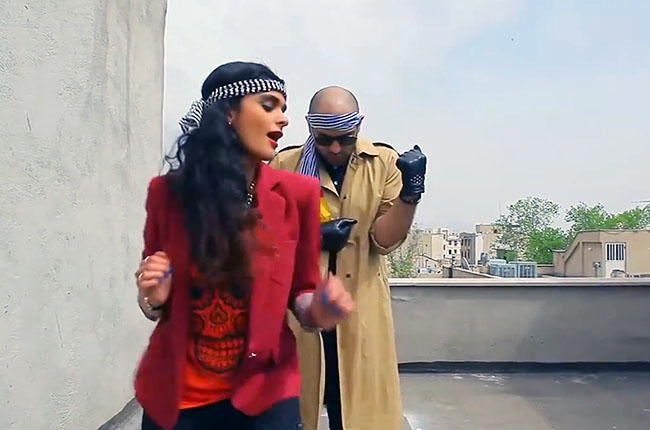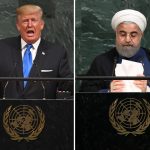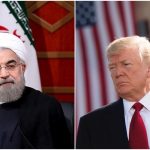*Editor’s note: Yesterday we covered the arrest of a group of young Iranians in Tehran, who made a video to Pharrell’s hit song, “Happy.” As noted in our story, the original fan video, which received over 160,000 views on YouTube over the month it was online, has since been marked private, but reproductions have been flourishing on the Internet. As of this posting, a May 20th (two days ago) upload by Pooya Jahandar has over 721,000 hits, and counting…
by Derek Davison
Friends, who among us has not been confronted by that irritating and morally corrosive internet video that both grates on the nerves and threatens to undermine everything that is good and decent in society? Are you interested in protecting others from being exposed to this filth? I’m here to help. Here’s a step-by-step guide to keeping YouTube’s dangerous grip off our beloved Islamic Republic:
Step 1: Find an offensive video to ban
 You might consider deliberately looking for something to get mad about strange, but rest assured that combing the internet for something that outrages you is a completely legitimate and highly productive use of your time.
You might consider deliberately looking for something to get mad about strange, but rest assured that combing the internet for something that outrages you is a completely legitimate and highly productive use of your time.
Now, you can’t redirect people’s outrage with just any video. Please use a discerning eye and find something that is really offensive. Like kittens — nobody likes kittens, with their little slashing claws and sharp teeth. Babies are also good — I mean, who likes babies? Or, hypothetically of course, you could find a video of pleasant-looking young people violating the long-held prohibition on men and women appearing together in an internet video and dancing to a song sung by an American who wears a funny hat. You’ll want something that’s gone a little “viral” but hasn’t blown up too much, because then you won’t be able to greatly increase awareness of the existence of the video while simultaneously trying to make sure that it never gets seen.
Step 2: Denounce the video and arrest the participants, ideally in the most public manner possible
 This is simple logic. How will people know that the YouTube video they probably haven’t seen is bad and offensive unless you do something very public to let them know? Answer: they won’t. This is not good; you can’t suppress something that only a few people know about! So put somebody in uniform, a police commander maybe, on camera to denounce the video and reassure the public that anyone who films themselves in a “false utopia” will be jolted into reality by squatting naked!
This is simple logic. How will people know that the YouTube video they probably haven’t seen is bad and offensive unless you do something very public to let them know? Answer: they won’t. This is not good; you can’t suppress something that only a few people know about! So put somebody in uniform, a police commander maybe, on camera to denounce the video and reassure the public that anyone who films themselves in a “false utopia” will be jolted into reality by squatting naked!
Then, arrest everybody involved in the making of the video. This will be difficult if we’re dealing with kittens because of the scratching and biting. Babies, on the other hand, are surprisingly easy to arrest, but they are unable to go on TV and confess to, well, whatever. This is why if you can find a video of dancing young people, that’s really the way to go. Anyway, stick the arrestees on TV and pressure them into confessing to something, anything, so the people watching know that regardless of who’s president, conservative forces will always be in control.
Step 3: Let the power of modern media work for you
By now your efforts are really starting to pay off. By publicly drawing massive amounts of attention to this video that a relatively small number of people had seen before you pointed it out to them, you’ve not only managed to alert your own public to the excellent work you’re doing, but you’ve gotten the foreign press interested as well.
6 Iranians arrested for making ‘Happy’ video via @CNN http://t.co/619PdZdXnI
— OutFrontCNN (@OutFrontCNN) May 21, 2014
This is great; young people think of the news media as “square,” which means “uncool,” so if the video is being covered by the media then people will be less interested in seeing it. Maybe you’ve even inspired a bunch of people to reproduce the original video so that even if the original is taken down the copies will still be available. This is excellent news, because our people are notoriously counter-culture and will not want to watch something if it’s all over the place, so the more copies of the video there are, the less likely it will be that anyone will look at it. If you’re really lucky, a major celebrity, like the American in the funny hat if you went that route, will publicly denounce your actions, maybe even a couple of times, and this is gold!
Then free these kids..? “@HassanRouhani: “#Happiness is our people’s right. We shouldn’t be too hard on behaviors caused by joy.” 29/6/2013” — Pharrell Williams (@Pharrell) May 22, 2014
Nobody listens to famous people who wear funny hats, because if they did then those people wouldn’t have to wear the funny hats to get attention. Again, this is all basic logic. So getting the funny hat man to talk about this story will really help make sure that nobody notices it.
Step 4: Release some of the participants in the video, but keep at least one so that the story doesn’t go away
By now it may be time to goose things a bit, to make sure that everybody keeps talking about the video you don’t want them to see, so publicly release most of the people involved, but hold one or two folks back in order to extend the story still further. This will give you more options for suppressing any knowledge of the video’s existence, like maybe a nice public trial or something.
Step 5: Congratulate yourselves on a job well done
Mission accomplished, my brothers and sisters! If you’ve followed these steps, then the offensive video that you found has been totally suppressed and its copies are not themselves all going viral, and your actions have not spawned a massive social media campaign against you, thereby exponentially increasing the number of people who have seen or are at least aware of the video.
Thanks .@Pharrell 4 posting about Iranian kids who sang w u. Thanks @kambizhosseini 4 suggesting #freehappyiranians pic.twitter.com/pRzv5IuvKO — Omid Memarian (@Omid_M) May 20, 2014
Hopefully this guide has helped you to restore order and morality to the internet and to your society. Now enjoy the accolades of your people, who undoubtedly are more convinced than ever of your great effectiveness as a leader and visionary!






Mr. Mike F.,
Convergence of interests either cultural, or, commercial usually do form the basis of political and military alliances. As such if we were to review in a historical context the relationship between Iran and United States post WW II, we could see a general alignment based on commitments that were given in the Tehran Conference by the allies to Iran for reconstruction of its economy post WW II, a period of failed delivery of such commitment commensurate with the rise of the nationalist movement and premiership of Dr. Mossadegh and the Nationalization effort of the 16th session of the Majlis. You will also a subtext see the free and democratically elected Majlis voting for the nationalization of the Iranian oil industry, away from the British Anglo Iranian Oil Company (AIOC) and towards indigenously controlled the National Iranian Oil Company (NIOC). The basis for this proposal was 50%-50% split on income between Iran and Britain, as it was the deal with the Saudi – US oil deal of the time and it was promulgated and supported by United States as a legitimate offer to the AIOC. “We recognize the right of sovereign states to nationalize provided there is just compensation.” Dean Acheson, Sec. of State, March, 1951.
As you may be aware, Mossadegh visited US from 10/8/51 thru 11/18/51. With the sole purpose of having US broker an oil deal with Britain. As such Mossadegh conducted in-depth negotiations with the Truman administration through Acheson and in particular with George McGee (Under Sec. for Political Affairs), who came from Conoco and had extensive knowledge of the oil industry, the final agreement, which was deemed fair and reasonable by US negotiators was similar as the Saudi deal, a 50-50 split. Acheson took the deal to London, at the time Eden and the Conservatives had come to power, and outright they rejected the entire scheme. Later on McGee who had worked very hard to craft the deal with Mossadegh, wrote, “There was silence as we grasped the fact that we had failed. To me it was almost the end of the world. I attached so much importance to an agreement and honestly thought we had provided the British a basis for one.” Later he met Mossadegh at his hotel and gave him the bad news, he wrote, “It was a moment I will never forget. He (Mossadegh) accepted the result quietly with no recrimination.”
Of course we know what happened two years later, in 1953, the trusted United States in collusion with the British engineered and mastered and led a coup-de-etat overthrew of Mossadegh, and with it Iranian democracy and sew the seeds of mistrust and suspicion that grew into 1979 Iranian revolution. Since the Iranian revolution the suspicion on both sides has grown, it also has been reinforced to where we are today.
As for “commonality” of purpose and their role in forging alliances, even though they are important, a look at our existing relationships could shed some light as to their degree of importance, or, lack thereof. For example, we value freedom of speech and respect for human rights, yet, we count Saudi Arabia, UAE, Qatar, Kuwait, Pakistan and intermittently, Egypt, among other equally incongruous group as our “allies”. Neither one of these countries has a record on human rights and free speech (as an example) that exceeds Iran’s. None has any meaningful elections, or, elected bodies that can and do influence policy (IRI Majlis actually does). The Persian Gulf Sheikdoms are outright old fashioned feudal autocratic regimes, with little change since 7th century not counting the skyscrapers. Yet we do have a naval fleet in that region to protect our national interests, and we are aligned with the southern littoral states of the Persian Gulf to varying extent. What binds us? Is it common culture? Political system? The answer I believe is OIL, and flow of oil to world markets. But then that is also what IRI wants, and that should be enough common ground to be able to work a deal, isn’t it?
I hate to state the obvious, bu the Iran after the Islamic revolution is certainly not the same Iran prior to the revolution. Also, what makes Iran unique is that its development both pre- and post-revolution is unique because of the creation of a theocratic, religious hegemony. That alone puts Iran in a very unique position since the only other state on this planet that operates in a similar manner is The Vatican. Thankfully we don’t have to worry about Rome wanting nuclear weapons and the Swiss Guard are not being sent to neighboring countries to fight or recruit Afghan refugees for $500 each to fight for them.
Consequently, many of those who make the arguments you made in regards to the 1953 coup have striven mightily to justify the past 35 years abhorrent human rights violations. Fortunately the West has long recognized that no past political situation justifies the present treatment of people.
For those that defend Iran’s right to self determination, I similarly denounce its choices to be a brutal state. As such I raise my voice, along with others to say that there can be no excuse for brutality no matter where it exists. Small men in power tend to exert it ruthlessly and should be condemned no matter what country they control.
“what makes Iran unique is that its development both pre- and post-revolution is unique because of the creation of a theocratic, religious hegemony.” Unfortunately, you seem not to see Israel, Pakistan, Iraq, Afghanistan, Saudi Arabia, Kuwait, UAE, Oman, among others as a theocratic driven states. You cannot find a single church or synagogue in any of the Persian Gulf southern littoral states. You can in Iran. Who is the more tolerant?
The other fact that you should consider is that history is interconnected, if we do not learn from it, we will repeat it. When there was 100% trust by Mossadegh in the Roosevelt administration, and when that trust was betrayed by the 1953 actions against Iran…. that is recent history for Iranians and couple that to what was done during the 8 year war with Iraq by unfortunately United States and Europeans (turning a blind eye to the mass gassing of Iranian military and civilians, rocketing Iranian cities by Saddam), you cannot blame the Iranian side for approaching the discussions with utmost mistrust. Iranians also recall that United States and its allies during the reign of Shah raised no objections to the gross human rights violations by that regime, it was OK when Savak tortured and killed Iranian opposition members…. All this history, that you cannot deny, creates the roots of what we are facing with Iran at this time. To simply ignore this history, is to approach the current negotiations from a position that perhaps does not render a fair chance of success.
In general as for your advocacy for human rights, I respect your views and I too hold and cherish them as a very dear possession, however, you also seem to not realize that as a binding glue of convergence of interests between cultures, per your previous response, human rights does not seem to play a very important role in development of political alliances between United States and its “international community”, i.e., Great Britain, France, Germany and EU; and such countries as Saudi Arabia, Kuwait, UAE, Oman, Bahrain and the like. Where do you see human rights getting in the way of the free flow of oil from the Saudi oil fields? As for IRI, many believe the best way to bring about change is not to shun them, but rather engage them. Question is asked as to what results have we gotten by shutting the door on them for the past three and a half decades? Have they ameliorated their human rights to accommodate a free’r society? The answer is negative. It is through engagement, constructive engagement that the West would get a chance to positively influence Iran, a hostile, belligerent position will only harden their reaction.
Do we want to start a war with Iran? Or, is a peaceful event outcome would be preferable? I believe peace is the only solution and the only virtue in diplomacy, successful diplomats with vision that goes beyond the next quarter’s results, are what we need on the ground … on both sides.
It’s nice you keep going back to 1953 as the source of all mistrust within Iran. I’m sure the American Indian felt the same way about Gen. Custer. But all societies must move forward and join in the same behavioral standards the international community expects. The Indians for casinos out of it. If Iran wants its frozen assets back, it has to demonstrate it can be a trustworthy partner and part of the demonstration must come by halting its barbarous human rights violation. Can we at least agree it’s a bad idea to hang people in public on cranes and we should stop that?! 700 and counting so far….
It is also amusing to see how sensitive you seem to be to the 1953 betrayal of Iranian trust, but you mentioned going forward… What is your assessment of the role we played in Iraq-Iran eight year war? If you were an Iranian would you trust United States more, or, less? How would you explain direct support for Saddam and provision of know how, raw materials and technology as well as targeting information in utilization of massive deadly chemical agents against both Iranian military and civilians by the Iraqi government at the time? How would your trust go when for years during that war and after repeated verifiable UN reporting of such utilization, US and its partners other than lip service, did not voice any concern on usage of such weapons of mass destruction against IRI? No sanctions, no threats of bombing of Iraqi suspected chemical weapons labs, nothing! Lets move forward some more… to say 2 years ago. MKE a terror group with Marxist origin that actually ambushed and assassinated Americans in Iran in the 70’s and was officially on a State Department terror list, now is walking the halls of our government fully restored and functioning in US and Europe. Given that the group in joining with Saddam not only attacked its own country and killed Iranian soldiers, in the infamous Enfal campaign of Saddam joined in with the former Iraqi Republican Guard in massacre of Iraqi Kurds! This too I take it according to your logic should garner even more trust from the Iranian side? I can go on and on Mr. Mike F., the time for visionaries on both sides to take charge is now, to bring peace from jaws of war that so many are bent to have. We can afterwards talk about You Tube, Twitter and other social media and their availability or not, in Iran….